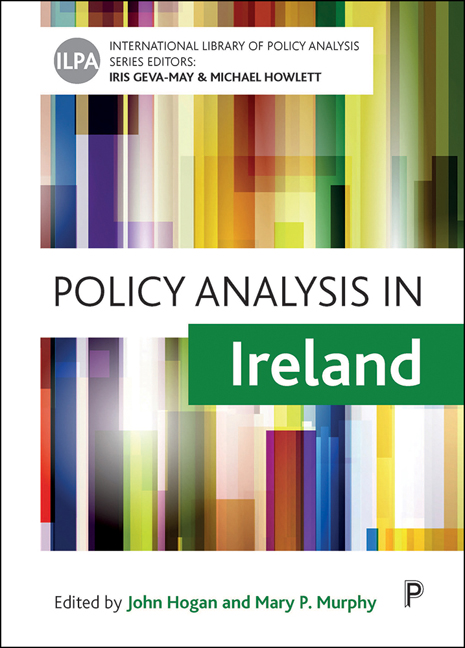Book contents
- Frontmatter
- Contents
- List of figures, tables and boxes
- List of abbreviations
- Notes on contributors
- Editors’ introduction to the series
- Acknowledgements
- Foreword
- Preface
- one Contextualising policy analysis in Ireland
- Part One: History, styles and methods of policy analysis in Ireland
- Part Two: Policy analysis at various levels of government: from local to the EU
- Part Three: Think tanks, interest groups, political parties and gender-based policy analysis
- Part Four: The public, science and the media: the wider policy analysis environment in Ireland
- Index
thirteen - Political parties and the policy process
Published online by Cambridge University Press: 18 December 2021
- Frontmatter
- Contents
- List of figures, tables and boxes
- List of abbreviations
- Notes on contributors
- Editors’ introduction to the series
- Acknowledgements
- Foreword
- Preface
- one Contextualising policy analysis in Ireland
- Part One: History, styles and methods of policy analysis in Ireland
- Part Two: Policy analysis at various levels of government: from local to the EU
- Part Three: Think tanks, interest groups, political parties and gender-based policy analysis
- Part Four: The public, science and the media: the wider policy analysis environment in Ireland
- Index
Summary
Introduction
This chapter examines the role that political parties play in the policy process. There already exists a wealth of literature characterising the policy process, to which this book is a welcome addition. Since, however, the focus of this chapter is the role that political parties play in the policy process, we use a very simplified model of the various stages in the policy process in order to examine how Irish political parties operate in each of these stages (see Figure 13.1). We exclude consideration of policy implementation, which is not the concern of political parties per se.
For each of these stages in the policy process, we summarise the role that might be expected of political parties in theory and how the Irish system operates in practice. We draw attention to the differences in behaviour between larger and smaller parties that are engendered by the political system, pointing in particular to the peculiar impact of localism on the impact and role of Irish political parties. We examine the key issues facing Irish political parties at each stage of the policy process, giving illustrations and examples to elucidate our points. In carrying out this task, we explore the extent to which the so-called ‘new politics’ might have affected political party roles and performance (see also Chapters Four and Twelve, this volume).
Our investigation suggests that what we currently refer to as new politics, that is, governments without a clear majority seeking consensual support for their policies in Dáil Éireann, is not in fact such a new phenomenon in Ireland. There has been no majority government since 1977. Fine Gael's agreement to support the economic reforms proposed by the minority Fianna Fáil government in 1987 – the so-called Tallaght Strategy (Mitchell, 2003) – together with Fianna Fáil's decision to abandon the principle of never entering a coalition, by going into government with the Progressive Democrats in 1989 (Mitchell, 2000, p 131), means that no party has governed alone since 1989. Programmatic government has been normalised and consensus seeking has become the de facto modus operandi for mainstream Irish political parties. The reality of the single transferable vote (STV) version of proportional representation (PR) used in Ireland means that no candidate seeking election can afford to stray too far from the wishes of the median voter.
- Type
- Chapter
- Information
- Policy Analysis in Ireland , pp. 187 - 202Publisher: Bristol University PressPrint publication year: 2021



